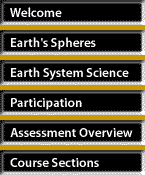 |
 |
 |
 |

Week B: Teacher As Scholar-Team
Essential Question Scholar
Assignment & Rubric
Weeks 5, 8, 11
and 14
Goal:
To come to a consensus as a team about the answers to the essential questions
for this cycle’s sphere.
Background:
Knowledge is built through discussion and interaction with others. Answer
the essential questions as a team by following a protocol a like this
one:
- post the essential question;
- answer it;
- include supporting statements
for the answer; and
- cite evidence for your answer
and supporting statements.
FOR EXAMPLE:
Essential Question:
How does life depend on water?
Answer:
Living things need fresh water to survive. Survival depends on food,
water, cleanliness, temperature, control, and movement.
Supporting Statement:
Fresh water is needed to
grow many plants that we eat.
Evidence:
Many plants need water to
grow. Water cycles between the various spheres of the earth system through
evaporation, condensation, precipitation, and runoff that nourish the
growth of plants. Course Outline Week 10, The Hydrosphere web site.
Supporting Statement:
Water can help people and other living things stay clean.
Evidence:
The Water Cycle shows when water is available for people to use for
bathing, cleaning, and cooking. Runoff can be used for many of these
things, and if purified water is used, the runoff may be used to water
plants in the water cycle. Course Outline Week 10
Supporting Statement:
Water helps living
things stay cool.
Evidence:
Animals can stand in bodies
of water to cool themselves. People can spray water on themselves to
keep cool. http://www.fi.edu/city/water/
Supporting Statement:
Water can be used
as a way to move to other places by boat.
Evidence:
Within the water cycle, water
forms rivers and streams that people have used to move from one place
to another easily. http://www.fi.edu/city/water/
Use the directions below to
complete this week’s team assignment.
|
Assignment
(by midnight Sunday)
Posting Instructions
for steps 1-2
Go
to the Classroom, then
to
Teacher As Scholar. |
1. You and your
teammates will conduct scholarly research to find answers to the
essential questions (located below assignment chart) for this week’s
sphere. Use the rubric below to help you define the team goal. The
thinking and reading you do about Earth system science in Week B
of each sphere cycle will help you to pose essential questions,
create problems, or develop authentic tasks to integrate the activities
you choose into a sphere lesson for your students in Week C.
2. Post your team
answers in Teacher As Scholar space. Consider having one team member
take the responsibility for compiling and posting all of the answers
to the essential questions that have been agreed upon. Or have one
team members be responsible for compiling and posting the final
answer to a specific essential question and another team member
responsible for a different question and final answer, etc. Whoever
is responsible should let the other teammates know where the information
is posted so that all members can link to this page from their portfolios.
Posting Instructions
for step 3
Go
to the Classroom, then to Portfolio Space. |
3. Go to your
portfolio in the Classroom to make links from your portfolio to
your team’s answers.
|
Essential Questions About
Each Sphere
Weeks 4-6 Land:
The Lithosphere
- How do rocks change?
- Where does soil come from?
- How does soil help plants
grow?
- What happens to plants
when they die?
- How do earthworms affect
the soil?
Weeks 7-9 Living Things:
The Biosphere
- How do plants and animals
live and die?
- How do occurrences in
other spheres affect the life and death of plants and animals?
- How do plants and animals
affect the land?
- How do plants and animals
affect each other?
- How is decomposition both
an end and a beginning?
- How does the terrarium
support the life needs of the plants and animals?
Weeks 10-12 Water: The
Hydrosphere
- How does water change?
- How does water move?
- How does life depend on
water?
- How does water affect the
land?
Weeks 13-15 Air: The
Atmosphere
- How do you study air?
- How does air change?
- What causes air to change?
- How does water exist in
air?
- How does air help living
things?
- How do we know about weather?
Rubric
You and your facilitator
will use the rubric below to gauge your team’s success in answering
the essential questions.
| Rubric
Criteria: Explanations:
Accurate, clear, detailed. |
4
Rating:
Accurate,
logical, concise, detailed scientific thinking using plain language.
|
3
Rating:
Accurate,
scientific paraphrased.
|
2
Rating:
Accurate
quotations or jargon.
|
1
Rating:
Accurate.
|
| Rubric
Criteria: Support:
Support for ideas, including ideas from experience, action research,
and reading. |
4
Rating:
Ideas
are supported with evidence from experience, action research, and
reading.
|
3
Rating:
Ideas
are supported with evidence from experience, action research, and
reading.
|
2
Rating:
Ideas
are supportable.
|
1
Rating:
Ideas
are stated clearly.
|
| Rubric
Criteria: Evidence:
Sources that establish the believability of the support. |
4
Rating:
Multiple
sources, accurate, complimentary.
|
3
Rating:
Multiple,
accurate.
|
2
Rating:
Core
sources used. |
1
Rating:
Some
sources, but not sufficient. |
[
Back ]
[
Welcome ] [Earth's Spheres
] [ Earth System Science ] [ Participation
]
[ Assessment Overview ] [ Course
Sections ]
[ Home ] [
Guide ] [ Outline ] [
Classroom ]
|
 |
 |




|
 |